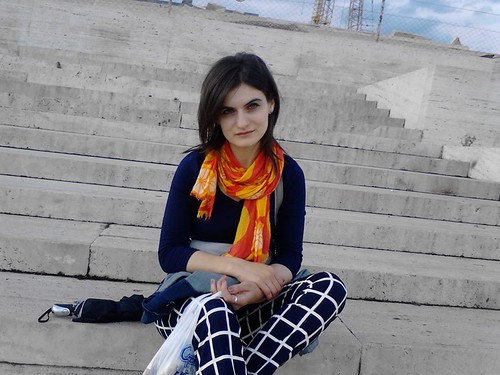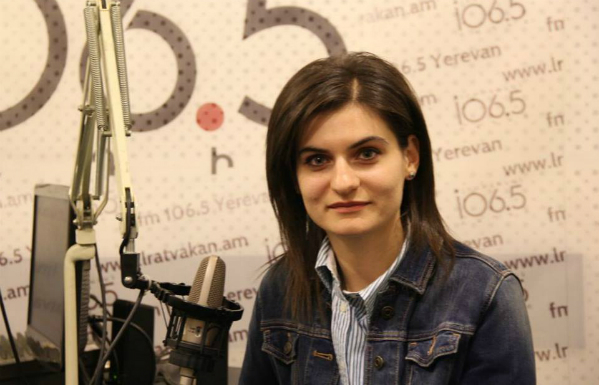Iranologist Anna Davtyan-Gevorgyan has two main interests: Islam and women’s rights. At the Center for Civilization and Cultural Studies at Yerevan State University, she works, teaches and conducts research.
Since graduating from the Women and Gender Studies program at Arizona State University’s School of Social Transformation, Anna has been trying to capture the public’s attention on the stereotypes of men and women in society.
Generally, religion and women’s rights are issues that propound the most difficult discourse, as they border on protecting tradition and perceiving liberalization. According to Anna, the word “gender” acquired a controversial meaning and became synonymous with perversion after Armenia began the process of joining the Customs Union [now, the Eurasian Economic Union] and now has a negative meaning.
All of us play different roles and try on different masks in our lives, and the cultural and social layers of those roles allow us to speak of a harmonious society. Anna Davtyan-Gevorgyan insists that feminism is nothing if not preaching for equality. And if there are stereotypes in everyday life, then they — being circulated in the media — are only going to become worse.
There exist rather stereotypical notions of women. How are these manifested in the media?
Discrimination can be measured on two levels. First is the purely quantitative measure (the media covers women less than men); the second, qualitative (from what perspective does it cover them). Now, of course, more attention is paid to women. According to research conducted a few years ago, images of women have increased in the media, and slowly this gap is closing.
This happened also due to the increase in the number of non-governmental organizations addressing women’s rights. Now when in different sectors experts are invited, there is an attempt to maintain gender balance.
But what concerns me more is how we cover women today. For instance, feminist demonstrations are covered quite oddly. Even those news outlets that want to be objective, all the same, use quite sexist language. For example, when demonstrations against violence against women were held in December, it was mentioned that abused women now contact the police more often [than before], and thus, the tradition of silent endurance is broken.
A very thorough and factually correct article on the demonstration was published, which, however, had the following headline: “Armenian Women Have Lost Their ‘Shame’” [AM]. Thus, the entire news piece acquired a negative meaning because of the headline.
| “The main characters of soap operas act rough, leading many children to have the illusion that in order to be good, they must dominate” |
Photojournalism also presents women’s issues and women’s rights protection in a negative light. And when it is said that women have lost their shame and this is accompanied by a photo of a small child to be pitied, the contradiction is intensified.
The language of the media not only reflects, but also perpetuates stereotypes.
It turns out that women who have been abused and who defend their rights become either the subjects of exceptional, scandalous news or worthy of unimportant, incidental attention.
It’s surprising, but nearly 80% of journalists in Armenia are women. Is there discrimination against men at least in this industry?
Recently, a professional, respected journalist (who is a man) said there is no gender discrimination in the media organizations he leads, and he prefers to work with female journalists. But what was surprising was his justification: “Male journalists’ egos often clashes with my ego, and they don’t do the tasks I assign to them. That’s why I hire women.” Basically, it became clear from his remarks that women don’t have an ego, they are largely obedient and compliant, and therefore they do their work well.
A stereotyped expectation of women (meek, conflict avoiders) has been shaped, and many women try to fit the mold — so as not to lose their femininity. If you break the mold, they will say you’re acting like a man.
Of course, all of us are subjective, but our country, after all, adopted a declaration stating that all types of gender discrimination must be eliminated. This means that this elimination is a value that if not adhered to is a violation of rights.
You are the co-author of a research study on masculinity and violence in [Armenian] soap operas. Can it be said that promoted is the image of an idle woman, since in soap operas we mainly see infantile women who don’t rush to work and lie on the couch, doing their nails?
Unfortunately, we mainly come across displays of aggressive masculinity in our soap operas. And for that masculinity to appear more pronounced, pictured next to a man are powerless, incapable women who do nothing but sit in the house. In the evening, the husband comes home and a habitual scene of violence occurs. The whole meaning of relationships between the sexes is presented in this context.
And what is concerning is that violence against women is shown as a component of masculinity. Not only negative, but also positive characters are shown with this disposition.
 Anna Davtyan-Gevorgyan
Anna Davtyan-Gevorgyan
Of the soap operas we monitored, Harazat Tshnami [“Own Enemy“] (Armenia TV), Ancyali Stvernery [“Shadows of the Past“] (Shant TV), only 911 (First Channel) was the exception. In the first two, there were no female characters who worked or at least had the opportunity for self-expression.
The second disappointing finding was the perception of domestic violence. For example, in one of the soap operas, nearly all the characters were convincing an abused woman who left her family that it’s ok that your husband beat you, better that you reconcile and bear it; to whom don’t such things happen?
We also conducted another study among audiences, and no respondent considered that situation to be violence.
Aren’t men subject to violence in soap operas?
Violence doesn’t necessarily have to be expressed through beating. Men are subjected mainly to psychological violence. In the show 911, for example, a woman constantly reproached her husband, a rescuer who received a paltry salary, for the lack of money and for not being able to provide for the family. The man was perceived as a wallet, and when the wallet is empty, it is no longer useful.
A solution was found in the soap opera: the rescuer does a heroic deed, and his wife begins to appreciate him. But this too is interesting: basically, the woman values her husband through the eyes of others, at the moment when the public applauds hims.
Have you attempted to participate in the process of developing ideas for soap operas?
I’ve wanted to. It’s a fact that soap operas have high ratings and are watched also online. The soap opera is a TV genre through which social messages can be conveyed to the public. We shouldn’t underestimate the soap opera — better to turn it into a tool that spreads ideas.
In Russian soap operas, for instance, promoted are mainly agents of law enforcement: soldiers, police officers, spies. What “manly” professions prevail in Armenian soap operas?
911‘s writer, for instance, said they intended to create a figure of a contemporary male hero, and since a police officer was not a convincing figure, they opted for rescuer. Generally, in the most popular Armenian soap operas of the last 10 years, the protagonists are either police officers or thieves in law; in other words, men with a clear hierarchy who use physical strength.
| “We mainly come across displays of aggressive masculinity in our soap operas. And for that masculinity to appear more pronounced, pictured next to a man are powerless, incapable women who do nothing but sit in the house” |
It’s difficult to show vertical hierarchy in a soap opera about, say, musicians, since it’s a story that develops horizontally. Whereas this is possible in the case of men who fought, fight, rescue, and represent the criminal world. By the way, often the boundary between them is so malleable that it’s not even felt.
The media suggests that men must be rough, and the main characters of soap operas act rough, leading many children to have the illusion that in order to be good, they must dominate.
In advertising, women are depicted mainly in supporting roles: they assist in promoting some product or service.
Yes, women help, they complement… this is called the objectification of people. The woman becomes only a body, advertising fodder, with the help of which absolutely everything is advertised. This is noticeable also in street advertising (billboards) — the naked body of a woman advertises even a football championship.
And when, for example, news about a woman is produced, it is not her intellect, spirit or thinking, but her body that becomes paramount. The raped, sold, or beautiful and alluring body. In advertising, men are thinking, active, taking initiative, and working, while women are merely decoration (first you look then pay attention to what’s being advertised).
Aren’t women newsmakers (MPs, government ministers) capable of challenging the stereotypes?
The issue is that in politics are mainly those women who place importance on and use the terminology of patriarchal (male-centred) values. They are how men want to see them. A woman appears in politics only with the help of a man.
The Minister of Diaspora, for example, said that her parents preferred and appreciated her brother more, satisfying all his wishes. In the minister’s opinion, this is normal, since this is how it is in traditional families. The brother sometimes hit his sister and pulled her hair.
[Vice-President of Armenia’s National Assembly] Hermine Naghdalyan says that parliamentary work for her is like marriage: your rights are cut in half while your obligations are doubled. It’s interesting, would a male MP say the same thing?
The wish to enter politics is evoked in women when images of successful women are shown in the media. Sociologists claim that a person’s choice is influenced first and foremost by positive images. You have to see what you can be in order to aspire to become that.
Interview by Nune Hakhverdyan.







